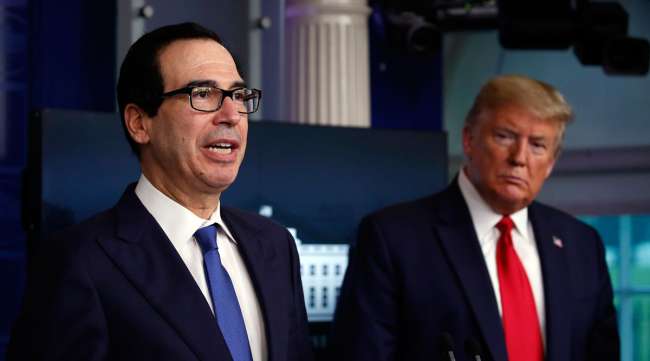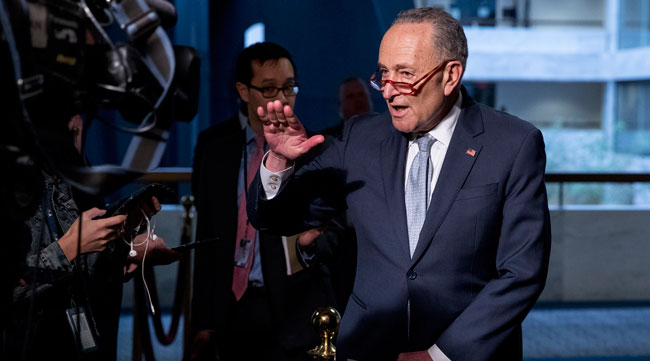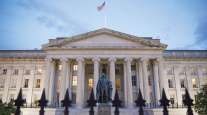Associated Press
Trump, Congress Near Deal on Small Business, Hospital Aid

[Ensure you have all the info you need in these unprecedented times. Subscribe now.]
WASHINGTON — The Trump administration and Congress expect an agreement April 20 on an aid package of up to $450 billion to boost a small-business loan program that has run out of money and add funds for hospitals and COVID-19 testing.
As talks continued, President Donald Trump said there’s a “good chance” of reaching a bipartisan agreement with Democrats.
“We are very close to a deal,” Trump said April 19 at the White House.
Along with the small-business boost, Trump said the negotiators were looking at “helping our hospitals,” particularly hard-hit rural health care providers.
The Senate is scheduled for a pro forma session April 20, but no vote has been set.
The House announced it could meet as soon as April 22 for a vote on the pending package, according to a schedule update from Majority Leader Steny Hoyer (D-Md.).
With small-business owners reeling during a coronavirus outbreak that has shuttered much economic activity, Treasury Secretary Steven Mnuchin said he was hopeful of a deal that could pass Congress quickly and get the Small Business Administration program back up by midweek.
“I’m hopeful that we can get that done,” Mnuchin said April 19.
Senate Minority Leader Chuck Schumer (D-N.Y.) also said he believed a deal could be reached. “We still have a few more details to deal with,” he said.
The emerging accord links the administration’s effort to replenish a small-business program with Democrats’ demands for more money for hospitals and virus testing. It would provide $300 billion for a small-business payroll program, and $50 billion would be available for a small-business disaster fund. Additionally, it would bring $75 billion for hospitals and $25 billion for testing, according to those involved in the talks.
On a conference call April 19 that included Trump, Mnuchin and Republican senators, Senate Majority Leader Mitch McConnell (R-Ky.) indicated the only remaining item for discussion involved the money for testing, according to a Senate GOP leadership aide who spoke on condition of anonymity to discuss a private call.
But Democrats have been insisting on boosting funding to cash-strapped states and local governments whose revenues have cratered. In weekend talks, they had proposed $150 billion for the effort.
“We are pushing hard,” Schumer said.

Senate Minority Leader Chuck Schumer speaks to reporters on Capitol Hill in Washington on March 20. (Andrew Harnik/Associated Press)
But Mnuchin and McConnell reiterated on the call with senators that money for state and local governments as well as food stamps would not be included in the package, according to the GOP aide.
“The president is willing to consider that in the next bill, but wants to get this over the finish line with a focus on small businesses, hospitals and testing,” Mnuchin said.
He said he’s been in touch with GOP leaders including House Minority Leader Kevin McCarthy (R-Calif.) and all are “on board with the same plan.”
House Speaker Nancy Pelosi (D-Calif.) predicted an agreement would be reached “soon.”
Under the emerging deal, the government’s Paycheck Protection Program for small businesses would get roughly $300 billion, according to Mnuchin. The Small Business Administration program has been swamped by companies applying for loans and reached its appropriations limit April 16 after approving nearly 1.7 million loans. That left thousands of small businesses in limbo as they sought help. An additional $50 billion in the evolving deal would go for disaster loans.
About $75 billion would go to U.S. hospitals, for those straining under a ballooning coronavirus caseload as well as those struggling to stay financially afloat after suspending elective surgeries during the pandemic. About $25 billion would be added for COVID-19 testing, something states have said was urgently needed.
Republican Maryland Gov. Larry Hogan, who leads the National Governors Association, said he and other governors believe that aid for state and local government is “desperately needed, but that it may not be an issue worth fighting over for now.”
Democratic New York Gov. Andrew Cuomo said states needed money from the federal government to ramp up testing, and he blasted legislation that wouldn’t provide it.
“You have the president saying 15 times, ‘It’s up to the governors, it’s up to the governors, it’s up to the governors,’ ” he said. “And then they’re going to pass a piece of legislation that gives you know what to states: zero, zilch, nada, niente. Whatever language you want to say it, nothing.”
The SBA loans, based on a company’s payroll costs, offer owners forgiveness if they retain workers or rehire those who have been laid off. The law provides for forgiveness for companies in any industry — even businesses like hedge funds and law firms. There’s a limit of $100,000 on the amount of employees’ compensation that can be considered when loan forgiveness is calculated.
Mnuchin, Schumer and Hogan appeared on CNN’s State of the Union, and Clark spoke on CBS’ Face the Nation.
Want more news? Listen to today's daily briefing:




